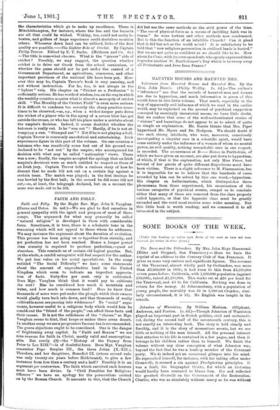FAITH AND FOLLY.
Faith and Folly. By the Right Rev. Mgr. John S. Vaughan. (Burns and Oates. 55. net.)—We are glad to find ourselves in general sympathy with the spirit and purpose of most of these essays. The argumert for what may generally be called "natural religion" is developed in them with considerable force. Sometimes, it is true, there is a scholastic tone in the reasoning which will not appeal to those whom he addresses. We may instance the argument about the duration of evolution. This process has been going on ex hypothesi from eternity, and yet perfection has not been reached. Hence a longer period than eternity is required to produce perfection,—quod eat absurdum. This reminds us of certain old logical puzzles. But, on the whole, a candid antagonist will feel respect for the author. We put less value on his social speculations. In the essay entitled "The Social Difficulty" we have some statements about the amount of unproductive land in the United Kingdom which seem to indicate an imperfect apprecia- tion of facts. Sixty-five per cent. only is cultivated. Does Mgr. Vaughan think that it would pay to cultivate the rest? Has he considered how much is mountain and water, and how much is common land ? Does he know that thousands of acres were put under the plough which their owners would gladly turn back into down, and that thousands of really cultivable acres are passing into wilderness ? No " social " argu- ments, however useful to a religions body which would fain be considered the "friend of the people," can affect these facts and their causes. It is not the selfishness of the "classes," as Mgr. Vaughan seems to hint, that keeps or makes these areas desert. In another essay we see a progressive Income-taxis recommended. The grave objections ought to be considered. One is the danger of frightening away capital. In "Faith and Reason" we see nine reasons for faith in Christ, mostly valid and unexception- able. But surely (9)—the "History of the Papacy from Peter to Leo XIII."—is of doubtful force. Does Mgr. Vaughan remember Pope Sergius III., the three Johns (X.-XII.), Theodora, and her daughters, Benedict IX. (whose second rule was only twenty-six years before Hildebrand). to give a few instances from less than a century and a half? Possibly it is an argument per contrarian's. The faith which survived such horrors must have been divine. In "Civil Penalties for Religious Offences" we have an apology for the persecutions carried on by the Roman Church. It amounts to this, that the Church did but use the same methods as the civil power of the time. "The use of physical force as a means of instilling faith was in vogue." So were torture and other methods now condemned. But is this the function of an infallible Church ? Can it plead that it did but act as the world acted ? It is satisfactory to be told that "now religious persecution in civilised lands is buried." But we are not quite as confident as we should like to be. How about La Croix, with its correspondents who openly expressed their hopes for another St. Bartholomew's Day which is to sweep away all Protestants and Jews from France ?






































 Previous page
Previous page